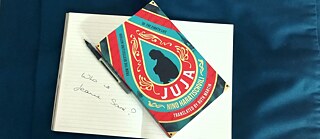September 2023
Nino Haratischvili: Juja

A complex narrative that is both haunting and relentless in its exploration of dark emotional themes, Nino Haratischvili’s debut novel, Juja, will appeal to fans of unflinching contemporary writers like Evie Wyld.
Georgian German author Nino Haratischvili first exploded on to the UK’s translated literature scene in 2020, when her epic The Eighth Life (for Brilka) was longlisted for the International Booker prize, translated by Charlotte Collins and Ruth Martin. Since then, Scribe has kept up a steady drip-feed of her novels: last year saw the publication of My Soul Twin (tr. Charlotte Collins), and this month the appearance of her debut novel, Juja, in a lyrical, nuanced translation by Ruth Martin. Reader, make no mistake: The Eighth Life this is not. But for all those enthralled by the narrative complexities, technical boldness and sheer emotional power of Haratischvili’s work, this early novel is not to be missed.
While it may lack the bulk of The Eighth Life (an intergenerational family saga that comes in at an impressive 934 pages), Juja is an undertaking no less ambitious. One of the hallmarks of Haratischvili’s fiction is the ferocity with which she writes – for all the choppiness of the plot, which switches frequently between characters and years, her prose is unrelenting, a tidal wave that sweeps even the most unsuspecting reader into the story. Juja is the kind of breathless novel that seems to bear traces of how it was written.
In its urgency, its interwoven structure, its feminist bent and determined confrontation of dark themes – not least violence done to women – Juja may appeal to readers of unflinching contemporary fiction such as Evie Wyld’s The Bass Rock. From suicide to sexual violence, there’s plenty of trigger-warning territory here, yet Haratischvili treads a fine line with adroitness, forcefully conveying her story while remaining on just the right side of too much. The constantly shifting narrative perspective helps, whipping us out of a storyline whenever respite is needed, as do the passages of soaring lyricism that seem chiefly interested in exploring what language can do. These, like the rest of the novel, have been carefully rendered by Martin into a rich tapestry of words as unsettling as it is beautiful.
A novel of many narrative offshoots, Juja revolves around a central mystery: who was the mysterious Jeanne Saré, purported author of a little-known book that appears to have caused several young women’s suicides in the 1970s? Strands of the story dated 1953, 1968 and 1986 converge on those of two central protagonists living in 2004, both of whom travel spontaneously to Paris in search of Saré’s identity. Laura is a successful yet emotionally adrift professor who tenaciously resists the pull of the enigma before being dragged under in spectacular fashion; Francesca is an Australian mother who has suffered an unspeakable trauma and finds her internal monologue reflected in Saré’s writing.
This – the curious power of words to reach out across decades, to contain solace or sorrow, to shape lives or break them – is one of the key themes of Haratischvili’s novel, a subject of seemingly endless fascination to which she returns often. And it is this, perhaps, that makes her writing so compelling: beneath the many layers of darkness, the violence and suffering and emotional torment, there is written into the very fabric of this novel the idea that it is all just a story. What do we choose to do with our words; how do they affect ourselves and others in the world? Juja doesn’t pretend to offer any answers. Instead, it merely gives in to the urgent human desire to explore such questions: vivid, compulsive, sometimes horrifying, a veritable haunting in words.
About the author
Eleanor Updegraff is a committed bookworm with a particular penchant for literature in translation. She makes her living from words in all forms: as a ghostwriter, German–English translator, copy-editor and book reviewer, and author of short stories and creative non-fiction. She grew up in the UK and has lived in Austria in 2015, where she’s often to be found in a coffee shop or running around a lakeLondon library: Borrow the original German title of Juja.
E-Library: Borrow the original German title of Juja digitally.
Find out more about the blog.
Book Blog Overview